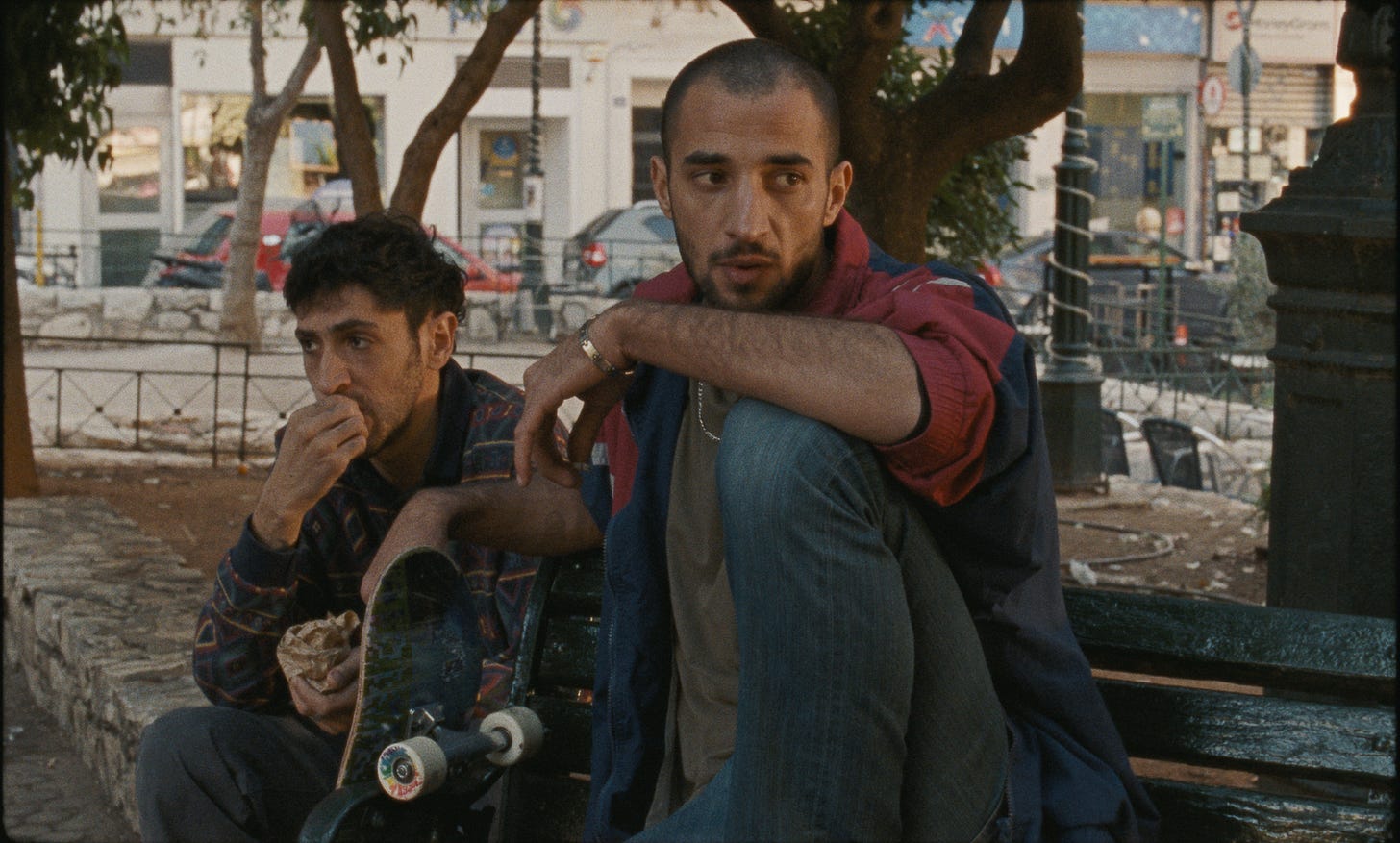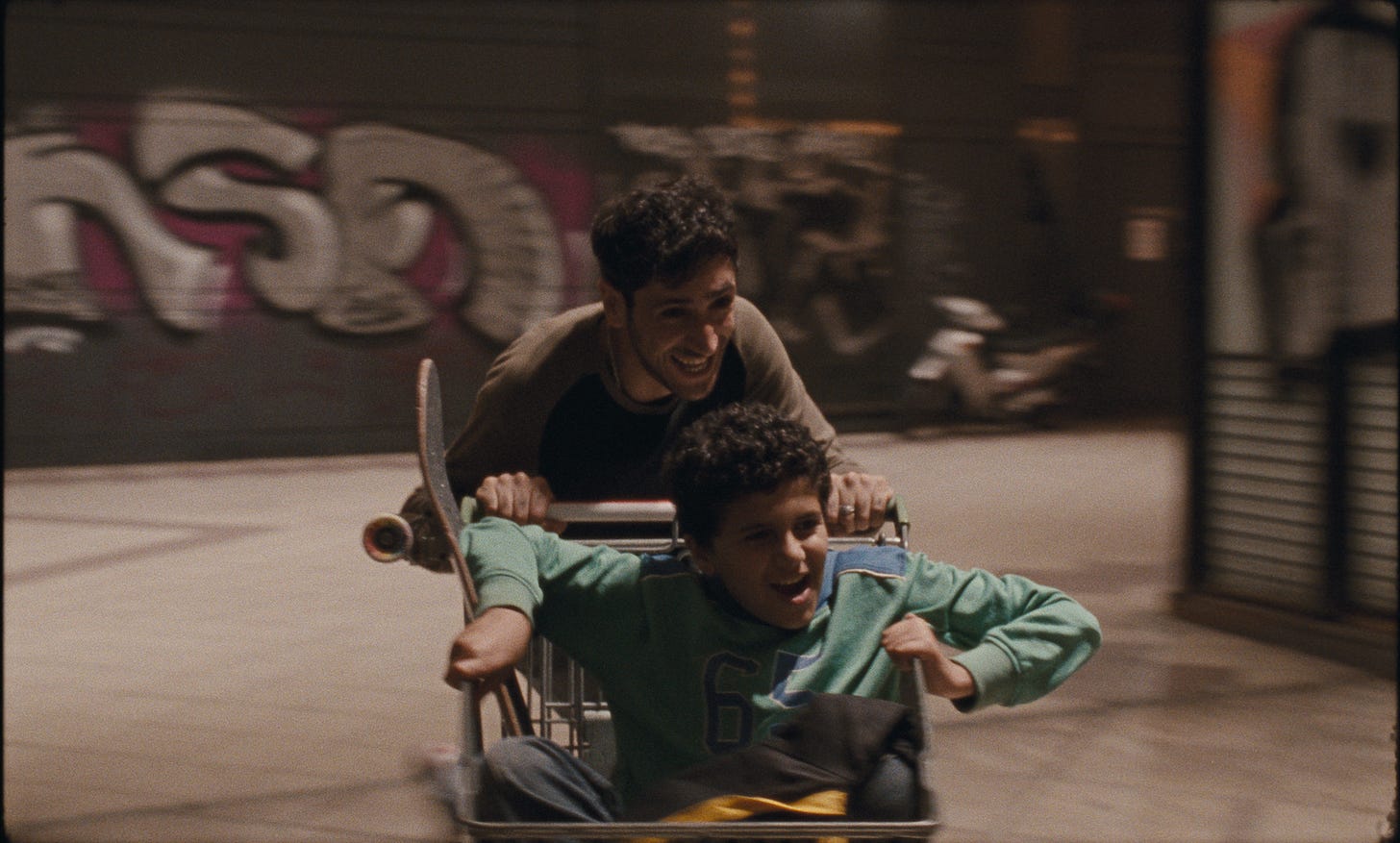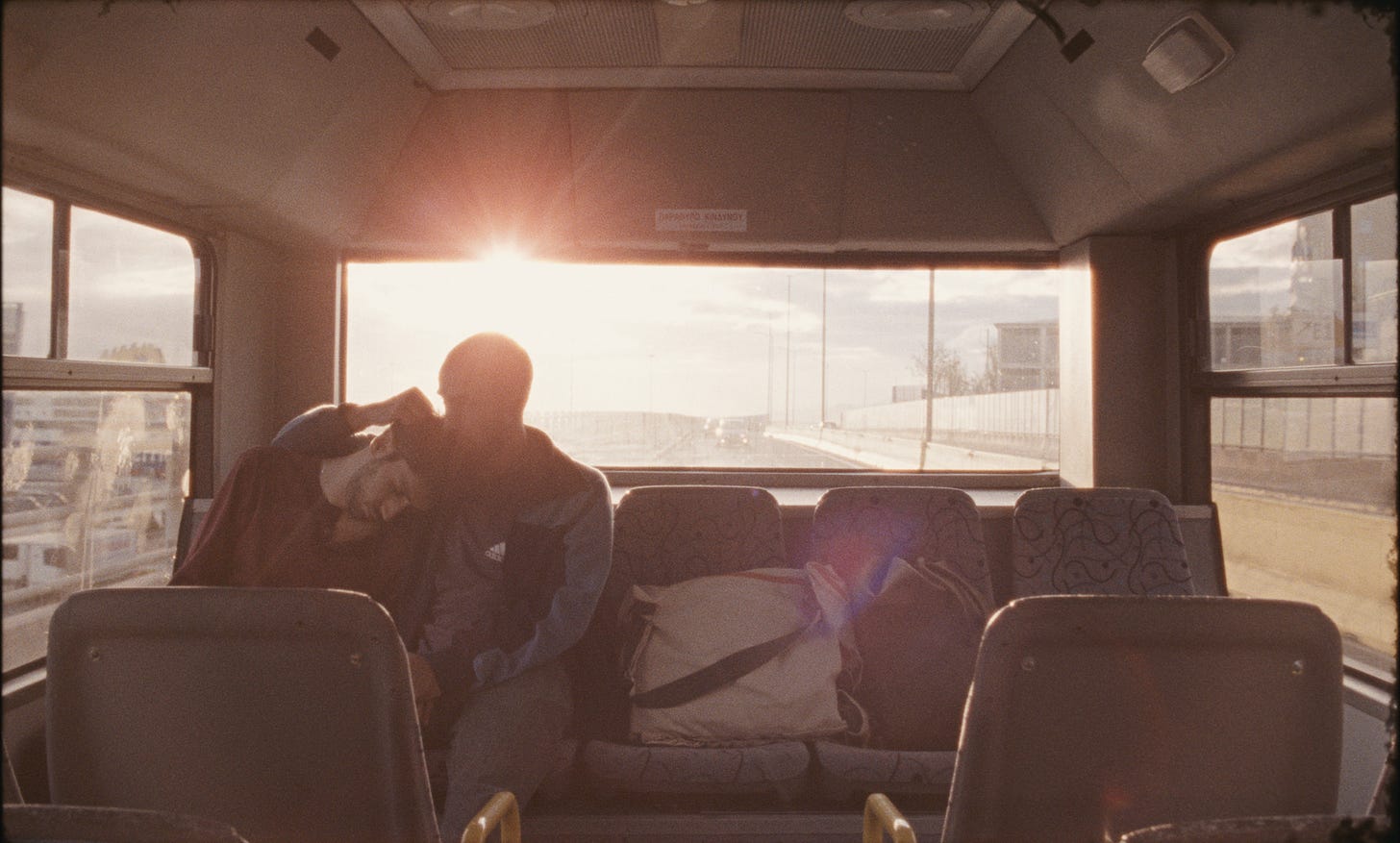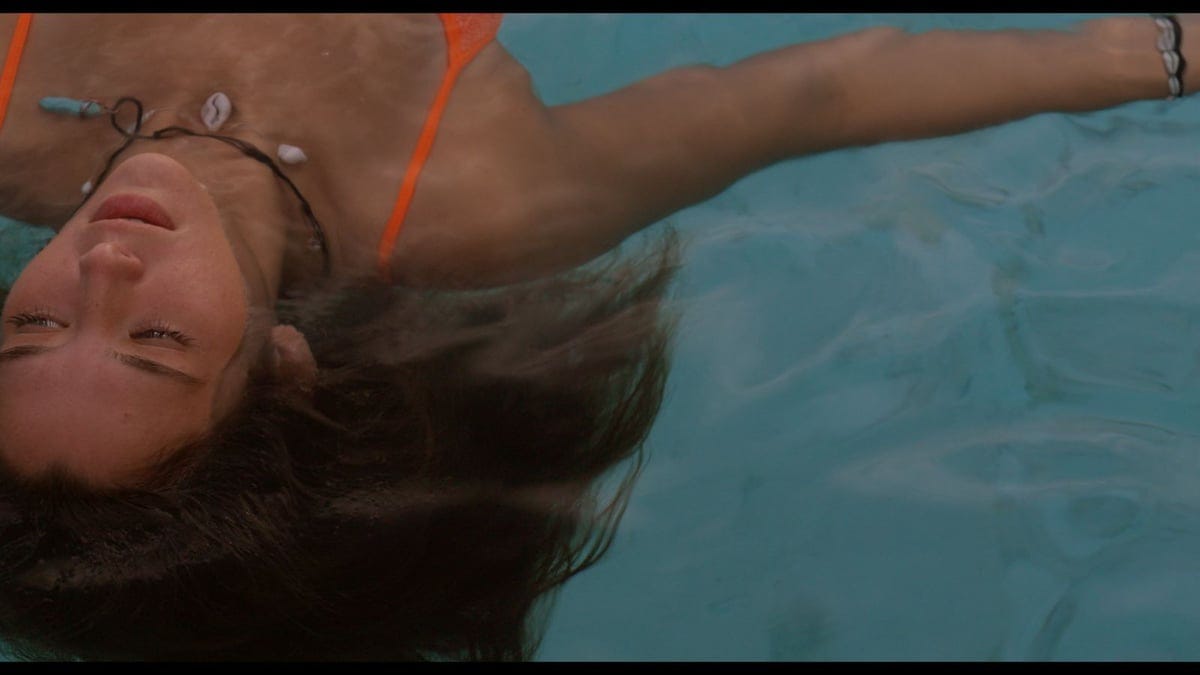Unsettled
Reviews of “To a Land Unknown” & “No Sleep Till”
Yesterday I was hanging out with a friend who was bemoaning this summer’s lack of alternatives to tentpole superhero and franchise fare. Of course, there are always new independent and/or arthouse titles to see, but they won’t show up at your AMC. Through this sweltering season I’ll do my best to highlight these movies that may be smaller in marketing spend but (hopefully) just as big in artistry. (And depending on where you live, this is a great time to go to your local repertory cinemas1.)
With these sharply observed character-driven stories that touch on hot-button political issues (the Palestinian refugee crisis and the influence of global warming on natural disasters, hoo boy!), Mahdi Fleifel and Alexandra Simpson's debut narrative features avoid message-driven topicality, being more concerned with effects than causes.
In case you missed it: I’m taking over the kitchen at Orion Bar in Bushwick on Sunday! RSVP on Partiful and click below to read a bit more about the pop-up.
My First Food Pop-Up is Next Week + Stuff I Did in June
June was not a good month to be out and about, since we had a week of that torrential rain followed by that horrific heat. (The start of July has been a relative balm.) I’ve largely been laying low since getting back from Spain earlier this month. I only ate out six times since returning, which is barely anything in a city like New York. There were a lo…
To a Land Unknown
Opens July 11 at Quad Cinema in NY as well as LA & Toronto; limited expansion to follow.
Centered on two Palestinian refugees stranded in Athens, Mahdi Fleifel’s neorealist crime drama bears more than a striking resemblance to Midnight Cowboy: both examine desperate characters driven to desperate measures by their hostile environments. The New York of Midnight Cowboy and its contemporaries is a land of alienation and stasis; the same could be said of the Athens in To a Land Unknown, which is more focused on its underworld than the Parthenon.
The downtrodden protagonists of this film are two cousins, Chatila and Reda (non-professional actors Mahmood Bakri and Aram Sabbah), who left behind Chatila’s wife and young son in a refugee camp in Lebanon. Their goal is to get to Germany, where they dream of opening a humble café. But they need fake passports to get there, and they don’t have the money. The pair scrounge up cash from petty theft and sex work, but much of their earnings are lost to Reda's on again, off again drug habit. Losing patience with their situation, Chatila launches a risky trafficking scheme involving a young boy (Mohammad Alsurafa), who has an aunt in Italy, and a lonely but kind-hearted Athenian woman (Angeliki Papoulia, a frequent star of early Yorgos Lanthimos films).
It’s not giving away too much to say that this plan does not succeed. (If it had, there would not be much of a movie.) That failure pushes Chatila and Reda to attempt an even more unethical scheme, but like Jon Voight’s character in Midnight Cowboy, we’re not meant to judge them solely based on their shady actions. When a society largely does not care for the disadvantaged, it harms everyone.
This is the narrative feature debut for Fleifel, who has previously made documentaries and short films about the realities of Palestinian displacement. It’s a personal subject for him, who grew up in Denmark and Dubai as the son of refugees. The script, co-written with Fyzal Boulifa and Jason McColgan, may be fictional, but it’s not far-fetched. While shooting his 2012 nonfiction film A World Not Ours, the filmmaker discovered Greece to be a fertile setting for a fictional story. For many refugees coming from the Middle East and elsewhere, the Mediterranean nation is meant to be their first stop in Europe, but sometimes it’s their last.
Aided by Thodoris Mihopoulos’s fine-grained Super 16 cinematography, To a Land Unknown gives us a clear view of a grim reality. Yet despite paying homage to 1970s New Hollywood cinema2, it lacks a distinctive cinematic style that would make the film a true successor to that movement. For the most part, it retains the dry formality of multinational European co-productions.
Hemmed in by one border after another, perhaps the Greek mythology that best applies to Chatila and Reda’s predicament is not Hades but Sisyphus. A lesser film would have transformed these characters into symbols, representing the plight of all Arab refugees. But even as their choices sink them farther away from morality, they're not pathologized. No one here is an activist or a martyr. They’re survivors who had chased a better life but now struggle just to have one at all.
No Sleep Till
Opens July 18 at the Metrograph in NY, other markets to follow. Adapted from previously published coverage of New Directors/New Films.
Before I watched No Sleep Till, I was flummoxed by its title. My brain would always autocomplete it with “Brooklyn!!!” even though, according to the synopsis, the film took place in Florida. No sleep till… Jacksonville? Now that I’ve seen the movie, the iconic song that pops in my head is no longer from the Beastie Boys. Towards the end, we catch a glimpse of a late night house party, revellers jumping up and down while outside, palm trees are whipped by the winds of an approaching hurricane. It’s Britney that I hear: keep on dancing till the world ends.
The effects of the climate crisis have been acutely felt in Florida, where hurricane seasons have increased in length and intensity. At the start of this film, one of those storms is days away from hitting the shores of Atlantic Beach, a coastal town near Jacksonville. There’s a mandatory evacuation order, and although most of the tourists and residents have already left, a few are in no hurry to leave fast. Alexandra Simpson’s slice of neo-Americana sits at the borders of atmospheric poetry and conventional narrative, much like the other films produced by Omnes Films (recent titles include Eephus and Christmas Eve at Miller’s Point). While this drifting, ambivalent style will put off some viewers, the feelings of liminal yearning it generates might as well be hypersonic missiles to my heart.
No Sleep Till is a lot like people watching: we float back and forth between the four main characters as they go about their days and nights. At first, it feels like we’re kept too far at arm’s length, but as narrative arcs emerge, we’re brought a little bit closer. There’s Will (Jordan Coley), a food delivery guy by day, very small-time standup comic by night. No one is paying attention to his set — the “audience” is busy playing pool — until he’s violently heckled. That intervention turns out to be a bit that Will runs with Mike (Xavier Brown-Sanders), a close friend who doesn’t match his ambitions to blow this town. A stormchaser (Taylor Benton) hopes to get the shot of a lifetime, and in the meantime he livestreams the darkening clouds and sleeps in his truck. And at the local swimming pool we find June (Brynne Hofbauer), perhaps seventeen, going under the water’s surface. After her morning swim, she bikes to her job at a souvenir shop, where the day’s revenue amounts to a whopping $16, and then heads to the skate park to hang out with her crush. None of these people ever meet, but they all see this hurricane as an opportunity to spur some kind of change in their stagnant lives.
Simpson, who wrote, directed, produced, and edited her feature film debut, softens her firmly observational approach with dreamy ambience. It suits the naturalistic performances from this cast, all of whom are first-time actors. Benton, a real-life stormchaser, was discovered on Instagram, and the director first met Hofbauer at the diner where she works as a waitress. It’s easy to lose oneself within this languorous vibe piece, thanks to its soundtrack — reverb-heavy guitars and glowing synth pads — and the gorgeously captured Florida coast. But there is something heavy at the film’s center. It’s no coincidence that all the principal characters are young. They are the most impacted by this warming planet and the crumbling empire that is America, contending with the consequences of our forebears’ desire to play God with the natural world. Through their nonchalant anticipation of this hurricane, and the broader climate anxieties it represents, we sense their shared desire for the winds and the waves to wash everything away. Maybe there will be a fresh start, maybe there will be nothing left. But if the hurricane changes its path, and the realization of our fears and hopes are deferred, what then? Perhaps sleep.
A postscript: In the end, the hurricane doesn’t come, and those who had stayed behind are spared from any real danger3. Nature is fickle and probabilistic. But war, ethnic cleansing, genocide: people cause those.
Last night I was at the MoMA for a 35mm screening of an obscure Indonesian action film starring the son of Robert Mitchum called American Hunter. Bad movie, it was a blast. I jotted down some thoughts on Letterboxd.
Fleifel provided a list of filmic inspirations to Letterboxd
You’ll be fine knowing the ending of this movie, it’s more sensory and vibey than about story.








